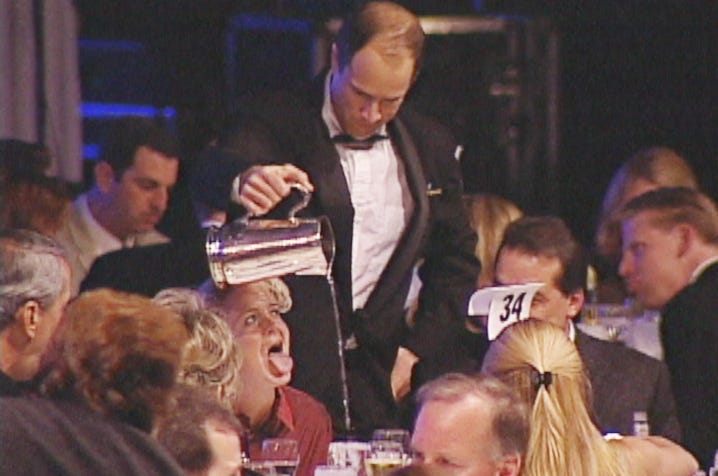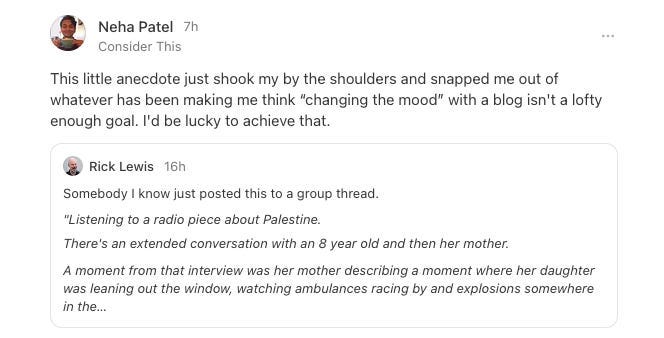No One Can Stop You From Sending Your Bubbles Into the World
Small actions are the rulers of mood
As usual when driving either of the kids to school I signaled to make a turn at the top of the block and then looked to the left to make sure the intersection was clear.
My teenage son, however, would patiently wait for this precise moment, taking advantage of my line of sight being directed away from the dash to nudge the volume up on the radio. It was a ritual part of our commute.
Every time I drove him anywhere, he’d jump in and immediately turn on the radio to a station of his choosing. I prefer silence, but for the minimal amount of time we spent in the car together I decided to acquiesce to the music.
What we would spar about, however, was the volume level.
Rather than engage in a full on power-struggle, I would try to pretend I didn’t notice the upward volume nudging, as I’m sure my adverse reaction to his music levels was fueling his determination to keep it loud. But privately, it annoyed the heck out of me.
Though well of age, my son was in no rush to get his driver’s license, so he spent more time in my passenger seat than a typical 18-year-old. It obligated me to do more chauffeuring than I counted on, but it also preserved opportunities for us to engage.
Still, I was convinced that my preference of traveling in contemplative silence was more conducive to us connecting than the blasting of rap. In the connection department—dad’s like me dream of their sons sharing details of their personal life, asking for fatherly advice, or just watching the world go by while communing with their kid. My personal paternal hopes were drowned out, however, by his need to have the radio on, and resulted in the repeated volume-battle that took place during the short drive. And it was playing itself out again on this particular day with the volume yo-yoing between our respective fingers—me advancing my story that silence is better, and him serving his own vision of a satisfying trip to school in the form of copious decibels.
But suddenly I had an ironic realization that actually made me chuckle. My annoyance, internally, was really loud. If my internal thoughts were amplified right now, I thought, they would not come close to honoring the silence I insist is superior. In fact, my sour mood was louder than the rap.
The next moment, I heard his music, like I hadn’t experienced it before. I heard the energy and enthusiasm of the beat, felt it in my body. I heard the wake up call of the words—inviting the listener to be authentic, passionate, and real.
I’d been momentarily released from my judgments and felt suddenly inspired to enjoy the experience. I reached enthusiastically forward for the volume button. My son lunged forward too, ready to correct my expected adjustment. But I took control of the dial like I had thousands of times before, and in a move that surprised us both, I cranked his song up to full volume.
I leaned back, eyes in the road while my seat throbbed to the drum track, and out of my peripheral vision I saw my son’s head slowly turn in my direction, trying to make sense of what had just happened to dad. I imagined it was a look of confusion that must have given way to delight, because soon we were both grinning from ear-to-ear and rocking out in our seats while the speakers thumped so loud I was sure the car was cartoonishly changing shape with each bass note.
As we finally reached the drop-off point, other parents were looking over at our pulsating car in judgment. It was uncomfortable to bear the stares, but it’s the most fun I’d ever had taking my kid to school.
An acquaintance of mine recently told this story.
I was listening to a radio piece about Palestine. There was an extended conversation with an 8 year old and then her mother. A snippet from the interview featured the mother describing a moment where her daughter was leaning out the window, watching ambulances racing by and explosions somewhere in the distance, repetitively blowing bubbles.
What are you doing? her mother asked.
I'm changing the mood, said the girl.
I’ve made my living for the last thirty years aggravating conference attendees by pretending to be a bad waiter before revealing that I’m actually the headline act at corporate events.
At a large insurance conference years ago the guests were unusually perturbed by my poor service.
One group grew more and more aggressive with their dirty looks as I made my way around the table, overfilling each water glass to the brim. The vibe at the dining round grew more and more intense, and I kept two large men in my peripheral vision just to make sure I wasn’t about to get blindsided by a sudden intervention.
I reached the last woman at the table who was looking at me quizzically, like I was a puzzle she was trying to figure out.
As I passed the water jug over her head to overfill her glass like the others, she waited until the water level had reached its peak and then responded like this.
The entire group burst into laughter, transformed in mood in a single instant by a moment of playful action.
I shared the story about the bubble-blowing girl in my Substack feed, and just the short anecdote alone had a mood-changing ripple effect on writer
.It was more than 50 years ago that Dr. Martin Luther King introduced a distinction that explains the power of such small actions.
In the final pages of a letter that Dr. King wrote while we was being detained inside a Birmingham city jail, he suggested that there’s a difference between a thermostat and a thermometer.
“In those days,” he wrote, speaking of early Christians, “the church was not merely a thermometer that recorded the ideas and principles of popular opinion; it was a thermostat that transformed the mores of society.”
A thermometer simply reports on the prevailing atmosphere. A thermostat, on the other hand, assumes responsibility for adjusting its temperature.
Dr. King knew that small committed actions offered in a mood of respect, nobility, and compassion—often within a hostile atmosphere—were the key to change.
Want to make a difference in the world?
Be a thermostat.
Lead the temperature, change the tone, shift the focus.
When things get tense, serious, or locked in on a power struggle—when you’re feeling particularly righteous, self-important, or justified—or when someone else has left their sense of humor behind—relax and look around for a small harmless action that has mood-shifting potential.
The next time you find yourself feeling like a victim of circumstance, feeling as though you’ve been taken prisoner by a prevailing mood, remember the example of Dr. King who decided instead to blow bubbles from a jail cell.
No one can stop you from writing a letter to the universe in the form of inspired action.









It takes a special person – indeed, a special father – to act the way you did that morning in the car. I can imagine how my dad would've reacted: the threats, the escalating tension, the shouting ... What bothers me is that, in the same scenario, I'd likely react the *same* way. That's (disturbing) food for thought.
By the way, I always love watching your waiter routine. Off-beat genius in action!
My kiddo loves blowing bubbles. Especially near the fan so they go far and wide. He also unconsciously blows them when I’m in a bit of a rage. Now I’ll remember. He’s changing the mood and so can I